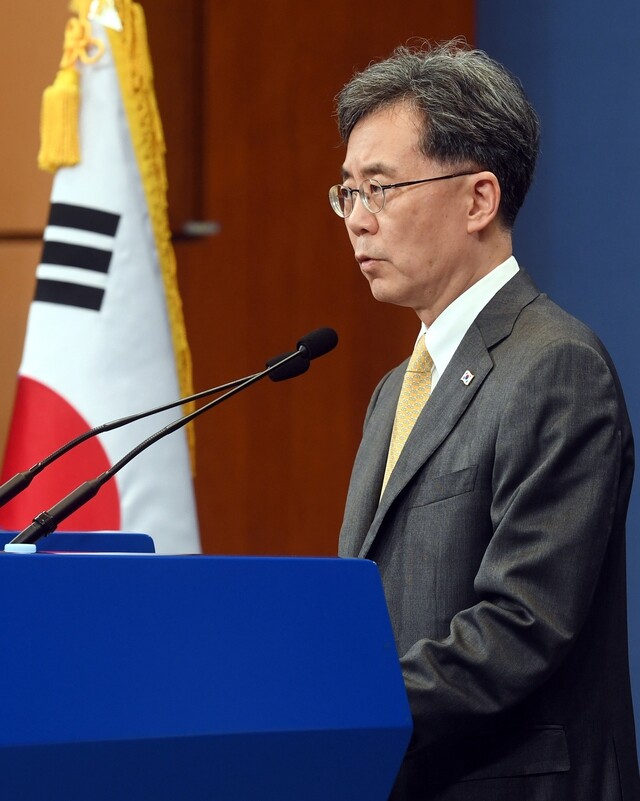hankyoreh
Links to other country sites 다른 나라 사이트 링크
[Editorial] Japan rejects dialogue, goes ahead with removing S. Korea from “white list”

The administration of Japanese Prime Minister Shinzo Abe ultimately went ahead on Aug. 23 with an amended Export Trade Control Order removing South Korea from its “white list” (Group A) of countries benefiting from expedited trade procedures. The South Korean government responded immediately with a Foreign Ministry spokesperson’s statement expressing “profound dismay and strong protest” and urging the decision’s “immediate withdrawal.” Kim Hyun-chong, second deputy chief of the Blue House National Security Office, also expressed “strong dismay” in a briefing that afternoon. A long and drawn-out economic war between the two sides is now looking inevitable.
Japan’s measure is deeply damaging to bilateral relations, rejecting as it does the proposals for dialogue made by Seoul in President Moon Jae-in’s National Liberation Day address and South Korea-Japan foreign minister talks. We cannot contain our disappointment at the Abe administration not only refusing to reflect on Japan’s history of aggression but also using brute force in an attempt to justify its misconduct.
As many have pointed out since Japan’s first round of retaliatory measures on July 4 (regulating exports for three major items), these export control measures are unfairly tied to historical matters and violate international norms. Despite the Abe administration’s claims that it is merely “changing its export management approach,” even the Japanese press takes it as a given that this is retaliation for a South Korean Supreme Court ruling on forced labor conscription. This was made apparent once again by Chief Cabinet Secretary and administration spokesperson Yoshihide Suga in a press conference the same day. Even as he claimed that the measures were “intended for suitable export management,” Suga also sent a message urging South Korea to resolve the conscription issue.
It also became apparent early on that Japan’s claims of South Korea’s controls on strategic goings being “sloppy” are untrue. An example of this can be seen in an assessment of controls in 200 countries last May by the US non-profit Institute for Science and International Security (ISIS), which ranked South Korea (17th) ahead of Japan (36th).
With this white list removal, Japanese companies that export strategic goods to South Korea face far more cumbersome procedures. Instead of simply undergo one review every three years, they will now have to receive case-by-case permits. The massive inconvenience and hassles this will mean for companies on both sides has concerns being voiced not just in South Korea but in Japan as well. It’s in that context that the Asahi Shimbun newspaper called for a summit between the two leaders, lamenting the “wasteful situation in which civilian economies on both sides are suffering.” The Abe administration should heed its message.
The South Korean government, for its part, needs to develop and implement response measures on the assumption that the situation could drag out into a long-term battle. The most pressing thing at the moment is to allay the companies’ fears. We also hope the measures for fostering the material, component, and equipment industries announced at a party/government/Blue House meeting the same day will be implemented without delay. Regardless of what happens with this situation, ecosystem innovations for materials and other basic industries are something we must achieve.
Please direct comments or questions to [english@hani.co.kr]

Editorial・opinion
![[Editorial] Intensifying US-China rivalry means Seoul must address uncertainty with Beijing sooner than later [Editorial] Intensifying US-China rivalry means Seoul must address uncertainty with Beijing sooner than later](https://flexible.img.hani.co.kr/flexible/normal/500/300/imgdb/original/2024/0517/8117159322045222.jpg) [Editorial] Intensifying US-China rivalry means Seoul must address uncertainty with Beijing sooner than later
[Editorial] Intensifying US-China rivalry means Seoul must address uncertainty with Beijing sooner than later![[Column] When ‘fairness’ means hate and violence [Column] When ‘fairness’ means hate and violence](https://flexible.img.hani.co.kr/flexible/normal/500/300/imgdb/original/2024/0516/7417158465908824.jpg) [Column] When ‘fairness’ means hate and violence
[Column] When ‘fairness’ means hate and violence- [Editorial] Yoon must stop abusing authority to shield himself from investigation
- [Column] US troop withdrawal from Korea could be the Acheson Line all over
- [Column] How to win back readers who’ve turned to YouTube for news
- [Column] Welcome to the president’s pity party
- [Editorial] Korea must respond firmly to Japan’s attempt to usurp Line
- [Editorial] Transfers of prosecutors investigating Korea’s first lady send chilling message
- [Column] Will Seoul’s ties with Moscow really recover on their own?
- [Column] Samsung’s ‘lost decade’ and Lee Jae-yong’s mismatched chopsticks
Most viewed articles
- 1[Editorial] Transfers of prosecutors investigating Korea’s first lady send chilling message
- 2[Exclusive] Unearthed memo suggests Gwangju Uprising missing may have been cremated
- 3[Column] US troop withdrawal from Korea could be the Acheson Line all over
- 4[Column] When ‘fairness’ means hate and violence
- 5‘Shot, stabbed, piled on a truck’: Mystery of missing dead at Gwangju Prison
- 6S. Korea “monitoring developments” after report of secret Chinese police station in Seoul
- 7[Editorial] Intensifying US-China rivalry means Seoul must address uncertainty with Beijing sooner t
- 8US has always pulled troops from Korea unilaterally — is Yoon prepared for it to happen again?
- 9China calls US tariffs ‘madness,’ warns of full-on trade conflict
- 10Seoul government announces comprehensive measures to prevent lonely deaths